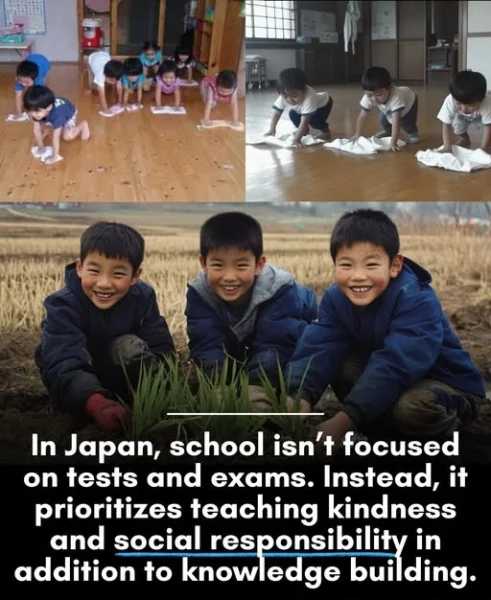In modern education systems, the comprehensive development of students remains a key objective that various educational models strive to achieve. While many countries employ traditional methods with rigorous tests and strict regulations, Japan has chosen a different path that encourages self-discipline and accountability without relying on external pressures or rewards. This article offers an in-depth look at how Japanese education not only emphasizes knowledge but also fosters character development and the cultivation of independent, self-reliant individuals.
In Japan, education goes beyond merely imparting information; it also involves building character and instilling a sense of social responsibility from an early age. Schools here focus on developing relationships among students, teachers, and the community, enabling students to clearly understand their duties both to society and to themselves. Teachers do not rely on rewards or punishments as tools to motivate; instead, they establish common goals for the class, encouraging students to work together toward shared achievements.

One of the most important aspects of the Japanese educational approach is the reduction of curricular overload. Japanese schools concentrate on delivering deeper, more meaningful knowledge rather than forcing students to cover a wide array of superficial subjects. Core subjects are typically accompanied by practical activities and experiments, which not only deepen students’ understanding but also promote critical thinking and effective problem-solving skills. The Japanese education system believes that only by combining theory with practice can students truly apply their knowledge to everyday life.
A significant difference in Japanese education is the creation of a learning environment without the use of rewards or punishments. Students are not pressured by grades or punitive measures; instead, they learn independently and take responsibility for their actions. Group activities, where every student contributes ideas and works collaboratively, foster a spirit of teamwork and develop cooperative attitudes within the classroom.
Notably, in Japanese schools, students learn not just for exams but to become responsible citizens. Every student is taught the value of hard work, discipline, and how to manage their own tasks. Schools organize extracurricular classes, sports, and cultural activities to develop essential life skills, going beyond textbook learning.
From these perspectives, it is clear that Japanese education focuses on nurturing character and developing essential life skills, enabling students to become self-disciplined, responsible, and capable of managing themselves without the need for strict oversight or academic pressure. This model of education could serve as an inspiration for many other countries, helping future generations to develop more holistically.
“Education is not about stuffing students with knowledge, but about helping them discover and develop their potential while learning to be responsible for society and their lives.” – Japan, 2023.
The Japanese educational system, with its foundational principles, provides a model that not only supports academic success but also shapes responsible citizens. Implementing these methods may be a crucial step toward educational reform in other countries, fostering a generation of self-motivated, independent, and responsible students without the need for excessive pressure.


HPX24h > Parenting Tips > Discover How Japan’s Education System Creates Self-Disciplined, Responsible Students Without the Need for Pressure
Top Reads from This Category
Parenting Tips
How to Talk to Your Child About Smoking Issues
Parenting Tips
The Way to Help Preschoolers Understand How Babies Are Made
Parenting Tips
Talking to Children About Race: How to Make It Easier?
Parenting Tips
Why Your Child Might Be Coughing Disruptively During Sleep?
Parenting Tips
How to Talk to Children About Alcohol (Ages 6-8)
Parenting Tips
How to Talk to Your Child About Drugs Effectively
Parenting Tips
How to Talk to Your Child About Divorce: Helpful Tips for Parents
Discover New Topics
Parenting Tips
My Child Is Pulling Out Her Hair: How Should I Handle This?
Science
Stem Cell Therapy for Lung Cancer: A New Hope Entering Human Trials
Animals
The Care of Offspring: The Reproductive Secrets of Guppies
Fitness
Effective And Safe Methods To Strengthen Your Knees: Proven Tips For Optimal Performance
Healthy Eating
The Benefits and Risks of the Keto Diet: Is It Really Good for Your Health?
Healthy Eating
Health is ‘Declining’ Due to Processed Foods: How to Turn the Tide
Fitness
Tai Chi: The Secret to Improving Balance and Relieving Pain Effectively
Science
Can Pregnant Women Experience Temporary Memory Loss? The Secrets Behind Brain Changes During Pregnancy
Science
The Shocking Truth About Medical Bandages: Harmful Chemicals Absorbed Through Wounds
Healthy Eating
What Is Nutrition? Why Is It Important For Health?
Healthy Eating
Vegan Keto Diet: Everything You Need To Know
Fitness
Muscle Strain During Exercise: Effective Prevention and Recovery Tips
Healthy Eating
How to Follow the 5:2 Diet: The Key to Effective Weight Management